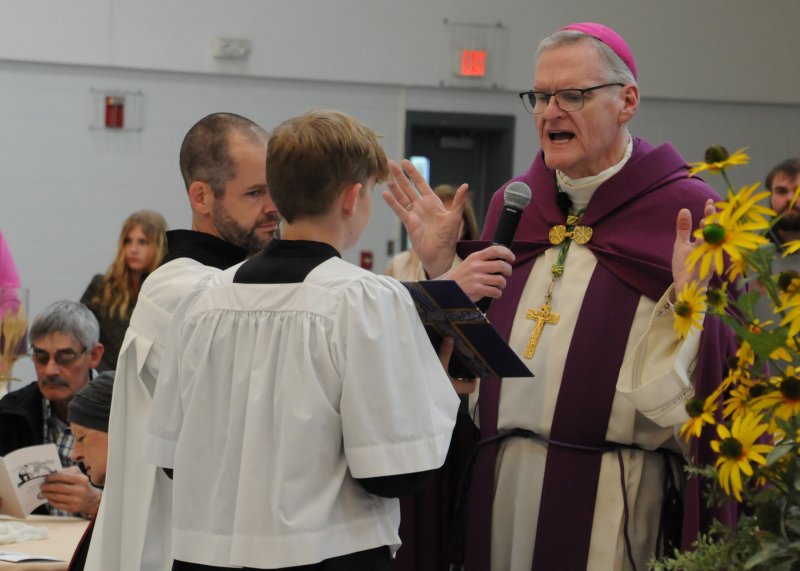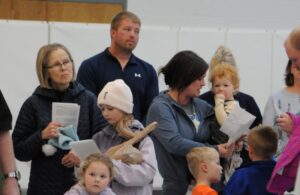
By John Rohlf
The Message assistant editor
Farmers and gardeners from across the Diocese of Evansville gathered at St. James Parish in Haubstadt last week for the annual Rogation Mass, which Bishop Joseph M. Siegel said has deep roots in the Church’s history.
The Rogation Mass, which celebrates the importance of farming and asks for God’s blessings and mercy during the planting and harvesting seasons, was held March 21 at St. James Parish in Haubstadt. The diocese has celebrated the Rogation Mass each year since 1988, when it was brought back as a staple for the diocese. Father John Boeglin, senior priest of the diocese, said he brought the Mass back to the diocese in 1988. It was a big deal for the diocese in the 1930s and 1940s, he said.
“It’s great to have so many people from across the diocese here,” Father Boeglin said.

Prior to the start of the annual Rogation Mass, Bishop Siegel led an opening prayer and those in attendance participated in the Litany of St. Isidore, followed by the Litany of the Saints. St. Isidore is the patron saint of farmers.
During the Litany of the Saints, the crowd processed from St. James School to the Church. After the procession and Litany, the Rogation Mass was held in the church. Bishop Siegel celebrated the Mass. Three priests of the diocese concelebrated the Mass.
During his homily, Bishop Siegel noted in the earlier times, Rogation Days were days of fasting and prayer that coincided with the planting season. The procession of litanies at that time included the celebration of Mass. In the same way, they started their Liturgy with prayers for a fruitful growing season and the Litany to St. Isidore during the procession. He noted they also prayed the Litany of all the saints, seeking their powerful intercession.
Bishop Siegel said the Rogation Mass is also an opportunity to pray for and give thanks to farmers for their essential work in bringing the harvest and providing food for our tables. Bishop Siegel referenced his upbringing, where he said he learned farming is an occupation and a way of life with mixed fortunes. It depended on the whims of the market and the weather, he said.
Bishop Siegel drew parallels between farming and our Catholic faith. He noted a farmer is forced to depend on and trust in God because so much is beyond the farmer’s control. This is a lesson of faith we need in our lives, Bishop Siegel said. He stressed we cannot be in control of all things or at all times.
During the season of Lent, we are called to reflect in a more focused way on Jesus’ suffering, death and Resurrection, which is commemorated during Holy Week, Bishop Siegel said. Holy Week began March 24 on Palm Sunday. He said the core of Holy Week is the Sacred Triduum, which is comprised of Holy Thursday, Good Friday and Easter. Bishop Siegel said these days are the pinnacle of the Church year as we commemorate, in an intense way, the mysteries of our salvation. We believe through the liturgies of Holy Thursday, Good Friday and Easter, the events of the Last Supper, the crucifixion and the Resurrection are made accessible to us, Bishop Siegel said.
Despite the services on Holy Thursday, Good Friday and the Easter Vigil not being days of obligation, Bishop Siegel recommended we participate in the Sacred Triduum liturgies. He said he believes we sell ourselves short and the faith short if we do not celebrate these liturgies. These are the holiest of holy days in which individuals have been preparing for all Lent, Bishop Siegel said.
At the end of the Mass, Bishop Siegel blessed soil and the seeds brought by those in attendance. After Bishop Siegel blessed the soil and seeds, Father Boeglin announced next year’s Rogation Mass will be held April 3 at St. Henry Church in Ferdinand.
